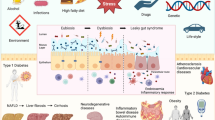Abstract
Iron supplementation is one of the principal therapies in inflammatory bowel disease. Iron is a major prooxidative agent; therefore therapeutic iron as well as heme iron from chronic mucosal bleeding can increase the iron-mediated oxidative stress in colitis by facilitating the Fenton reaction, namely production of hydroxyl radicals. In the present study colitis was induced in the iodoacetamide rat model. Forty male Whistar rats were divided into four groups, each group receiving a different diet regimen in parallel with colitis induction: Malondialdehyde was measured to assess the degree of tissue oxidative stress. There were microscopic changes, and significantly more severe colitis was seen in colonic biopsies when iron was supplemented. It was concluded that iron supplementation can amplify the inflammatory response and enhance the subsequent mucosal damage in a rat model of colitis. We suggest that the resultant oxidative stress generated by iron supplementation leads to the extension and propagation of crypt abscesses.
Similar content being viewed by others
REFERENCES
Grisham MB, Yamada T: Neutrophils nitrogen oxides and inflammatory bowel disease. Ann NY Acad Sci 30-115, 1992
Aust SD, Morehouse LA, Thomas CE: Role of metals in oxygen radical reactions. Free Radic Biol Med 1:3-25, 1986
Minotti G: Sources and role of iron in lipid peroxidation. Chem Res Toxicol 2:134-146, 1993
Vav der Zee J, Krootjes BBH, Chignel CF, Dubbelman TMAR, VanSteveninck J: Hydroxyl radical generation by a light dependent Fenton reaction. Free Radic Biol Med 14:105-113, 1993
Halliwel B, Cutteridge JC: Role of free radicals and catalytic metral ions in human disease: An overview. Methods Enzymol 186:1-8, 1990
Health and Human Services Committee: Guide for the Care and Use of Laboratory Animals. Publication 85-21. Bethesda, Maryland, National Institutes of Health
Bradly PP, Priebat DA, Christensen RD, Rothestein G: Measurement of cutaneous inflammation estimation of neutrophil content with an enzyme marker. J Invest Dermatol 78:206-209, 1982
Buege JA, Aust SD: Microsomal lipid peroxidation. Methods Enzymol 52:302-306, 1978
Grisham MB: Oxidants and free radicals in inflammatory bowel disease. The Lancet 334:859-861, 1994
Dillard CJ, Downey JE, Tappel AL: Effect of antioxidants on lipid peroxidation in iron-loaded rats. Lipids 19:127-133, 1979
Dillard CJ, Gavino VC, Tappel AL: Relative antioxidant effectiveness of a tocoperol in iron loaded rats. J Nutr 113:2266-2273, 1983
Wu WH, Meydani M, Meydani SN, Burklund PM, Blumberg JB, Munro HN: Effect of dietary iron overload on lipid peroxidation prostaglandin synthesis and lymphocyte proliferation in young and old rats. J Nutr 120:280-289, 1990
Babbs CF: Oxygen radicals in ulcerative colitis. Free Radic Biol Med 13:169-181, 1992
Author information
Authors and Affiliations
Rights and permissions
About this article
Cite this article
Reifen, R., Matas, Z., Zeidel, L. et al. Iron Supplementation May Aggravate Inflammatory Status of Colitis in a Rat Model. Dig Dis Sci 45, 394–397 (2000). https://doi.org/10.1023/A:1005437331967
Issue Date:
DOI: https://doi.org/10.1023/A:1005437331967




